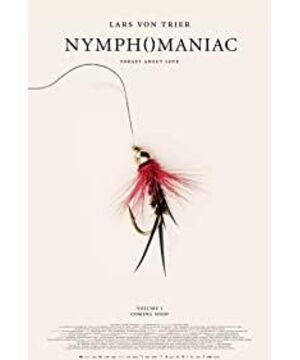But half of it has been forgotten.
Nymphomaniac is translated as "female addict", and although it does differ from sex addict, I tend to use it as a symptomatic description, which is fine from this point of view. And this translation does not involve the so-called patriarchal concept. The so-called patriarchal and feminist concept itself is a pre-existing value. It is like saying "how can you say that he is black? You are racist", which includes the evaluator's own pre-existing concept. .
Joe said, I'm not addicted to need, I'm addicted to porn. Erotica constructed a space around me. Erotica becomes the direct driver of Joe's behavior here: sexualltrieb (sexual drive). But the inseparability of the two in action makes Joe's discourse a symptom of Verneinung (denial).
Joe is the symbol of the Big Other in the film. She is very aware of her position in the process of satisfying her desires, she is sober, and she maintains an absolute sense of distance. Just as Segliman used the fishing analogy throughout the conversation, Joe considered himself the bait. In other words, she knew she was Phallus herself.
conversation. The conversation between Joe and Segliman is itself quasi-psychoanalytic. But this is not a real psychoanalytic dialogue. Since Segliman doesn't have a sense of distance from Joe, I think he's lusting after Joe as he tells it. I guess Joe felt it, or he felt it unconsciously, she didn't stop, she kept seducing Segliman through the dialogue, so the initiative of the dialogue was reversed, and the relationship between Segliman and Joe changed from speaker and listener to Seducers and Desires. She is constantly establishing herself as the Big Other unconsciously. Heard she killed him in the lower part...even I have reason to think that Segliman brought home Joe who was down on the road at the very beginning of the movie out of sex drive.
Father. This is the most important image of the whole film. The father is actually the ultimate object of Joe's sexuality. When Joe was very young, she felt the separation of her family of origin. She loves her father but calls her mother stupid cunt. A proper intuitive expression of the Oedipus complex. The mother as the father's wife is Joe's enemy. And, when Joe and his friends were masturbating in the toilet (should count?), the mother came to knock on the door to interrupt, indicating that the mother here represents a kind of sexual repression, while the father, on the contrary, has been tolerant after he noticed Joe's abnormality. She, this tolerance is undoubtedly a release of sexual repression. Father liked to take Joe to see the ash tree when she was a child. The ash tree here serves as a metaphor for the father's place in Joe's desire, since sexual urges for the father must be repressed. (And the similarity in tree and genital form) This symbol is used almost throughout the film until the death of the father. This part has always been suppressed with Joe, and there is even reason to think that Joe may be one of the roots of Nymphomaniac.
Love. Joe didn't believe in love at first. Love, she says, is sex plus jealousy. So she never had sex with the same man, and her best friend who fell in love was regarded as a betrayal. From a psychoanalytic point of view, love is the complement of sex, and sex is the most original driving force, which is consistent with Joe. On the surface, the person who bears the image of Joe's love is Jerome, Joe's "first love", but there is no love. By the second half of the film almost everyone agrees that Joe is unquestionably in love with Jerome, but here I have a question mark. After the reunion, she first turned down Jerome's sexual invitation to her because she didn't have sex with the same man. But it was Jerome's estrangement from her that gave her the illusion of love, and it was at this moment that Joe felt she was in love with him. Isn't it a meconnaissance (misrecognition) of Joe's own status as the Other being threatened? Furthermore, according to Joe's own understanding of love, a kind of "jealousy" did not show to Jerome's wife Liz. This kind of jealousy is very obvious to the mother, if she really loves Jerome, it is impossible not to show it. And, after being separated from Jerome, she tries to find similarities to him in many people. Such a tragic and romantic act can be explained entirely as an unconscious Wiederholungzwang (principle of forced repetition). The best expression is when she said that she wanted to be one of his things, placed in a special sequence in the clutter. Her unconscious is constantly emphasizing that she is Phallus, the desire to be the object of her desire. A sexual perversion that has been hinted at in the first half of the film, namely Jerome's femininity, and the masculine calm and control he possesses when dealing with various objects of desire. Phallus' lust turned back again. Finally, when Joe and Jerome meet again at the end of the film, and they're making love, Joe says, fill all the holes in me. Empty. Love is always something unimportant in her. Of course, in other words, it doesn't matter anyway, and it doesn't matter if you say love. It's not so good, just love it, it doesn't matter anyway.
It's also interesting that Seligman points out that Joe's description of Jerome is too unreal, and they always meet by chance. Given that what Joe says is what she believes to be true, the memory of this fitting encounter is likely the result of unconscious modification. Everything is rationalized and in line with wishes.
It ends with Joe suddenly losing his libido, and she says she can't feel anything. What is certain is that this is not disappearance, but a repression. As for the source of depression, I haven't figured it out yet, maybe it's because I didn't take it seriously, or maybe it's a foreshadowing for the lower part.
And I think the abridged version of the plot is still coherent, if you don't really want to watch the restricted footage, this version is enough.
Let's go and see below.
View more about Nymphomaniac: Vol. I reviews











